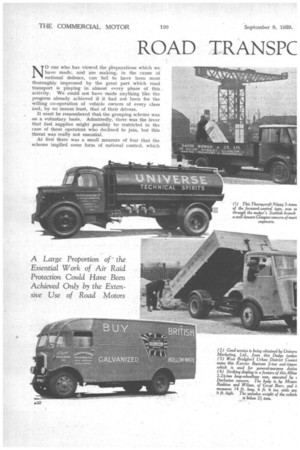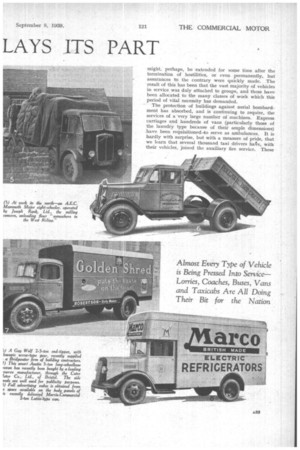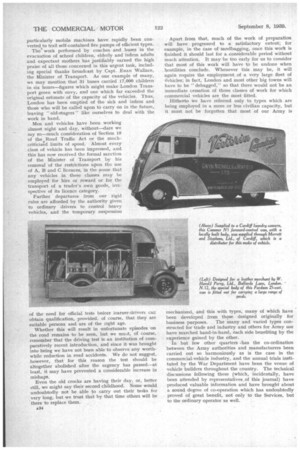ROAD TRANSPC LAYS ITS PART
Page 34

Page 35

Page 36

If you've noticed an error in this article please click here to report it so we can fix it.
N0 one who has viewed the frreparations which we have made, and are making, in the cause of national defence, can fail to have been most thoroughly impressed by the great part which road transport is playing in almost every phase of this. activity. We could not have made anything like the progress already achieved if it had not been for the willing co-operation of vehicle owners of every class and, by no means least, that of their drivers.
.. It must be remembered that the grouping scheme was on a voluntary basis. Admittedly, there was the lever that fuel supplies might possibly be restricted in the case of those operators who declined to join, but this threat was really not essential.
At first there was a small measure of fear that the scheme implied some form of national control, which might, perhaps, be extended for some time after the termination of hostilities, or even permanently, but assurances to the contrary were quickly made. The result of this has been that the vast majority of vehicles in service was duly attached to groups, and these have been allocated to the many classes of work which this period of vital necessity has demanded.
' The protection of buildings against aerial bombardment has absorbed, and is continuing to require, the services of a very large number of machines. Express carriages and hundreds of vans (particularly those of the laundry type because of their ample dimensions) have been requisitioned-to serve as ambulances. It is hardly with surprise, but with a measure of pride, that we learn that several thousand taxi drivers hate, with their vehicles, joined the auxiliary fire service. These
particularly mobile machines have rapidly been converted to trail self-contained fire pumps of efficient types.
The work performed by coaches and buses in the evacuation of school children, elderly and infirm adults and expectant mothers has justifiably earned the high praise of all those concerned in this urgent task, including special thanks broadcast by Capt. Email Wallace, the Minister of Transport. As one example of many, we may mention that 31 buses carried 17,000 children in six hours—figures which might make London Transport green with envy, and one which far exceeded the original estimate of the capacity of the vehicles. Thus, London has been emptied of the sick and infirm and those who will be called upon to carry on in the future, leaving "old-stagers" like ourselves to deal with the work in hand.
Men and vehicles have been working almost night and day, without—dare we say so—much consideration of Section 19 of the Road Traffic Act or the muchcriticiied limits of speed. Almost every class of vehicle has been impressed, and this has now received the formal sanction of the Minister of Transport by his removal of the restrictions upon the use of A, B and C licences, in the sense that any vehicles in these classes may be employed for hire or reward or for the transport of a trader's own goods, irrespective of its licence category.
Further departures from our rigid rules are afforded by the authority given to ordinary drivers to control heavy vehicles, and the temporary suspension of the need for official tests before learner-drivers can obtain qualification, provided, of course, that they are suitable persons and are of the right age.
Whether this will result in unfortunate episodes on the road remains to be seen, but we must, of course, remember that the driving test is an institution of comparatively recent introduction, and since it was brought into being we have not been able to observe any worthwhile reduction in road accidents. We do not suggest, however, that for this reason the test should be altogether abolished after the urgency has passed—at least, it may have prevented a considerable increase in mishaps.
Even the old crocks are having their day, or, better still, we might say their second childhood. Some would undoubtedly not be able to carry out their tasks for .very long, but we trust that by that time others will be there to replace them.
A34 Apart from that, much of the work of preparation will have progressed to a satisfactory extent; for example, in the case of sandbagging, once this work is finished it should last for a considerable period without much attention. It may be too early for us to consider that most of this work will have to be undone when , hostilities conclude. Whenever this may be, it will again require the employment of a very large fleet of vehicles; in fact, London and most other big towns will have to be " deba.gged," so that there would not be an immediate cessation of those classes of work for which commercial vehicles are the most fitted.
Hitherto we have referred only to types which are being employed in a more or less civilian capacity, but it must not be forgotten that most of our Army is
mechanized, and this with types, many of which have been developed from those designed originally for business purposes_ The many and varied types constructed for trade and industry and others for Army use have marched hand-in-hand, each side benefiting by the experience gained by the other.
In but few other quarters has the co-ordination between the Army authorities and manufacturers been carried out so harmoniously as is the case in the commercial-vehicle industry, and the annual trials instituted by the War Department have been the venue. of vehicle builders throughout the country. The technical discussions following these (which, incidentally, have been attended by representatives.of this journal) have produced valuable information and have brought about a sound degree of co-operation which has undoubtedly proved of great benefit, not only to the Services, but to the ordinary operator as well.




































































